Join Us at the September CSU Board of Trustees; Get to Know the Trustees
The CSU Board of Trustees will reconvene in Long Beach on September 7-10. We are strongly encouraging CFA members, especially from the Southern California campuses, to sign up here and register here to offer public comment on September 9.
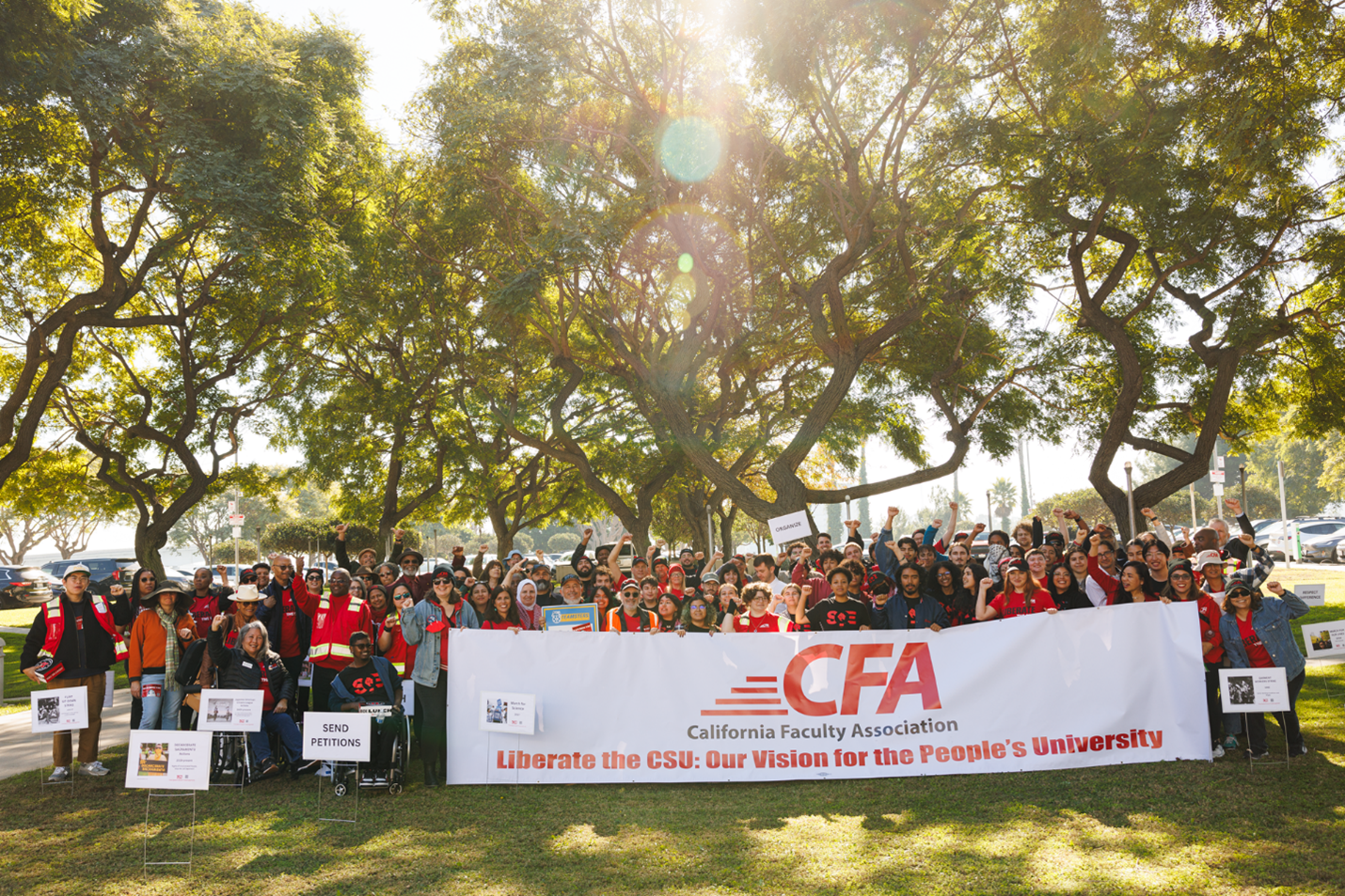
Together with Students for Quality Education (SQE) and our sibling union members from Teamsters Local 2010, CSU Employees Union (CSUEU), Academic Professional of California (APC), and United Auto Workers (UAW) Local 4123, we will be holding a rally to bring attention to the similar experiences that we have all been facing under a mismanaged CSU system. Our goal is to let legislators and community members know how harmful the administration’s actions have been to public higher education, immigrant communities, and anyone who wishes to protect free speech and academic freedom.
CFA members fought hard to protect state funding for the CSU, eliminating what would have been an ongoing 3%, or $143.8 million, cut to the CSU’s base funding. However, we still need to eliminate a 3% reduction for this year, and the state has offered a 0% interest short-term loan to do exactly this.
We demand the Chancellor’s Office and the trustees accept the loan and use it not to increase the systems already substantial amassed wealth, or hire new managers with exorbitant salaries, but to support instruction and restore jobs they prematurely cut. It is unfathomable why they are leaving these funds “on the table” when these monies can go directly in support of student’s educational needs.
Our work to protect immigrant and mixed-status families both on and off our campuses continues. We urge the trustees to honor our values as a university and ensure a safe and inclusive teaching and learning environment for every one of our faculty members, staff, and students. To that end, we reject the interim Time, Place, Manner policy that has created a chilling effect and wrongfully censored free speech.
Below, we have offered an introduction to the purpose of the Board of Trustees as well as background on some of the trustees.
Meet the CSU Board of Trustees Part 1
The California State University Board of Trustees oversees the CSU and adopts rules, regulations, and policies governing it. The board has authority over curricular development, use of property, development of facilities, and fiscal and human resources management.
California law requires 25 trustees for the California State University System. Five trustees are ex-officio members: the Governor, Lieutenant Governor, Speaker of the Assembly, State Superintendent of Public Instruction, and the Chancellor. The governor appoints 16 trustees who are confirmed by the State Senate. These trustees serve eight-year terms, but they are sometimes reappointed to serve longer.
Additionally, four other trustees serve two-year terms. They are one alumni trustee, one faculty trustee, and two student trustees. The CSU Alumni Council appoints an alumni trustee and the governor appoints a faculty trustee from nominees proposed by the Academic Senate of the CSU. The governor also appoints two student trustees from nominees proposed by the California State Student Association.
Make sure to stay tuned to the governor’s race next year, as whoever holds the office has tremendous power in selecting who runs the CSU.
Disappointingly, few trustees have experience in higher education and even fewer have ties to the CSU. The consequences of this lack of experience are clear. Trustees hired Chancellor Mildred García, whose tenure has been defined by excluding faculty voices, amassing a pile of unfair labor practice charges, and unnecessary stalling in our bargaining efforts.
Here are four trustees you should know along with decisions and remarks they have made on the board.
Jean Picker Firstenberg
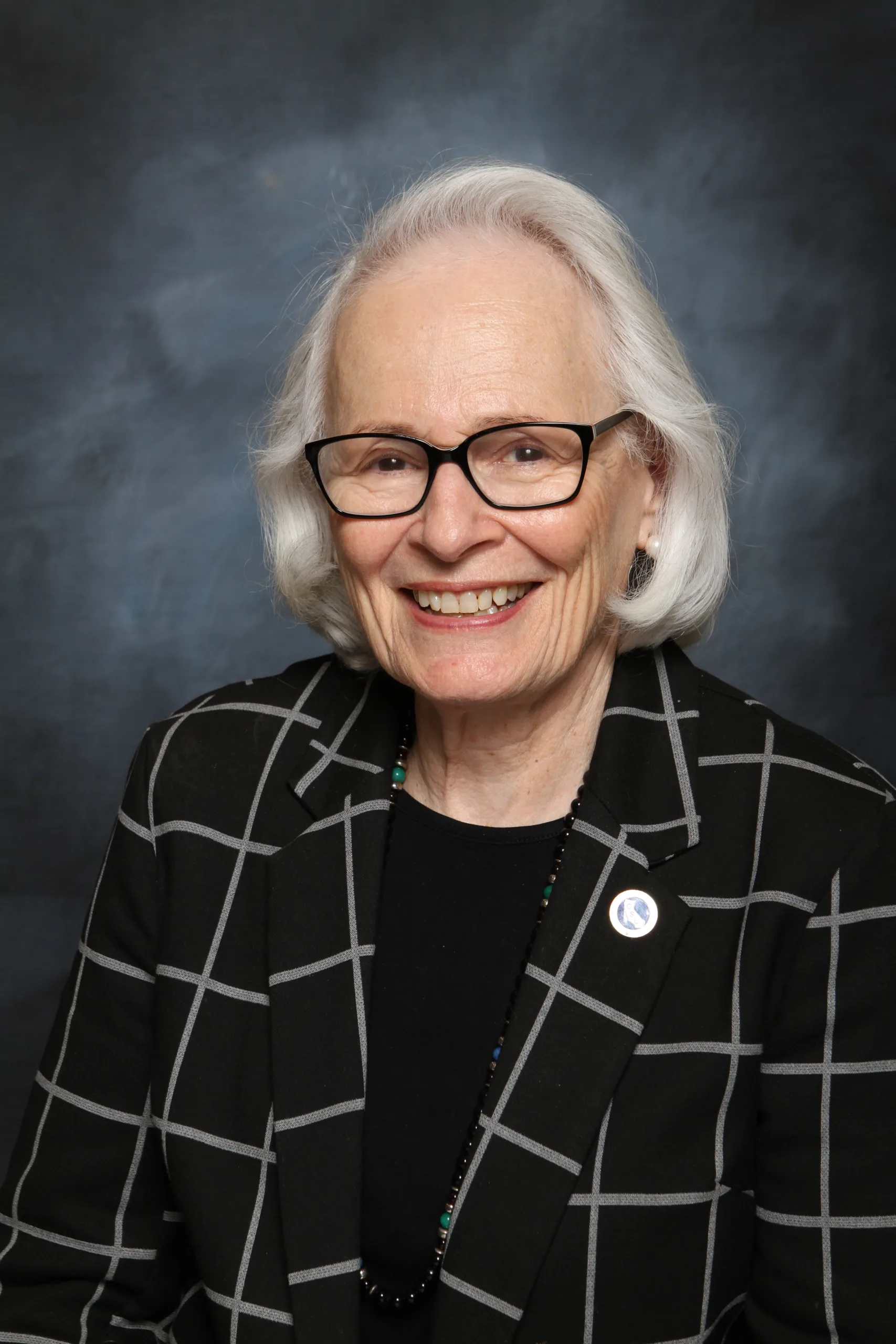
Jean Picker Firstenberg was president and CEO of the American Film Institute for 28 years. Before that, she worked as a program officer for John and Mary R. Markle Foundation and director of Princeton University’s Publications Office.
She was appointed to the board in 2016 and had no ties to the CSU prior to that. She is the current chair of the University and Faculty Personnel Committee.
In September 2021, Firstenberg voted to approve implementing a policy on campus president salary reviews. The policy tied triennial performance reviews to market data, enabling trustees to approve raises of up to 10% in the first year.
During the discussion, Firstenberg characterized the issue of presidential salaries as “one of the most important issues as a board that we can discuss.” She made this comment during a board meeting where public comment speakers discussed lack of faculty diversity, fossil fuel divestment, defunding campus police, mental health funding, systemic racism, CFA contract bargaining, and health and safety concerns with campus repopulation amid COVID-19.
In July 2022, Firstenberg also voted to increase salaries for most CSU executives by at least 7%. At the time, she claimed that pay equity at all levels was justice, despite the disparity between faculty and the highest-paid executives.
“We are in this together: board, presidents, faculty, staff,”. We support all of you. We care about all of you.”
Jean Picker Firstenberg
“We are in this together: board, presidents, faculty, staff,” Firstenberg said. “We support all of you. We care about all of you.”
Wenda Fong
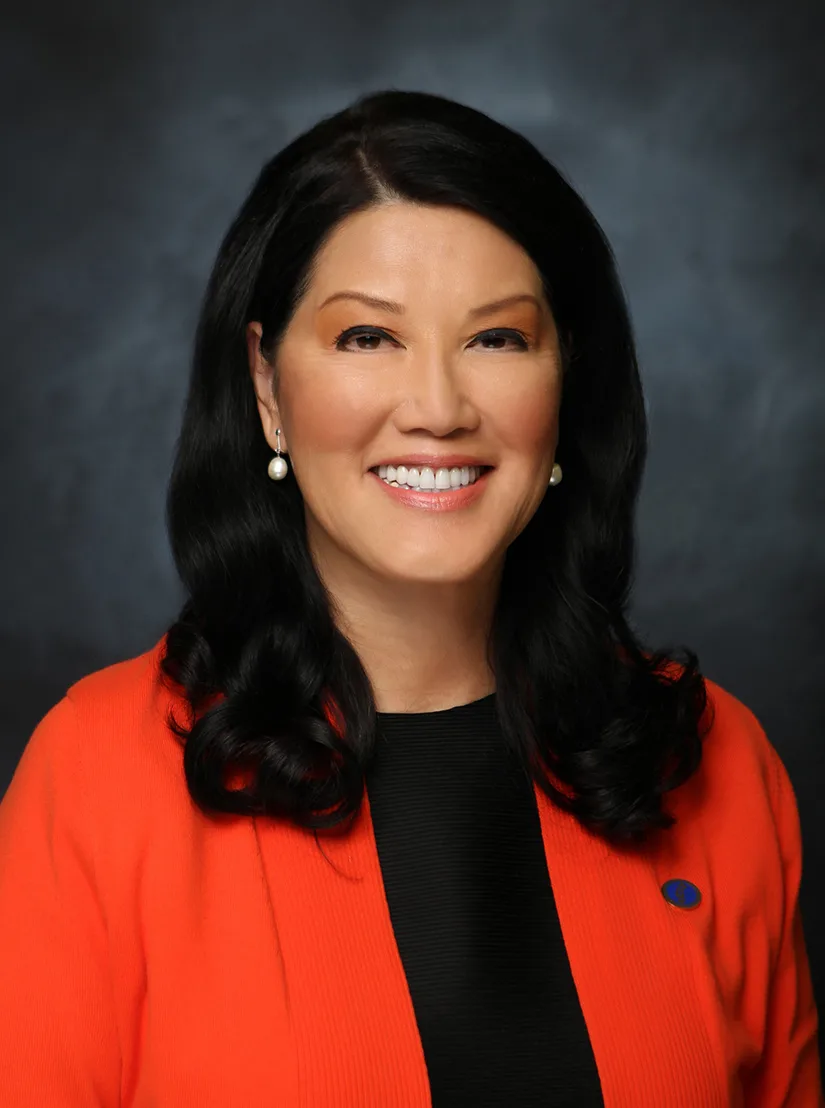
Wenda Fong has worked in television for 40-plus years. She has produced and directed music and variety specials, awards shows, reality specials, sitcoms, talk shows, documentaries, public service announcements, and live events. A CSU profile of her says she “may have been slightly surprised” at her appointment to the board in 2018.
In July 2022, Fong — who chaired the board at that time — voted to increase salaries for most CSU executives by at least 7%. She told her colleagues that paying senior leaders competitively was imperative and in line with the CSU’s values.
“Ultimately, it’s about doing the right thing,” Fong said during the meeting. “Not only for the current and future leaders of this great institution, but also for the students, our faculty and our staff they so ably lead.”
In March 2024, Fong ignored strenuous objections from faculty by approving misguided changes that imposed General Education updates developed for transfer students on all CSU students. Known as the California General Education Transfer Curriculum (Cal-GETC), it removed one Arts and Humanities class and the Lifelong Learning and Self-Development course General Education requirements. Trustees made this curricular decision to decrease the breadth and depth of the General Education requirements without addressing reasonable arguments by those who spend time actually teaching students.
“Ultimately, it’s about doing the right thing. Not only for the current and future leaders of this great institution, but also for the students, our faculty and our staff they so ably lead.”
Wenda Fong
Even though Fong claimed that students could still take those courses if they wished, CFA members knew that the changes would discourage students from exploring different disciplines and would harm student success, especially for students of color.
Jack McGrory
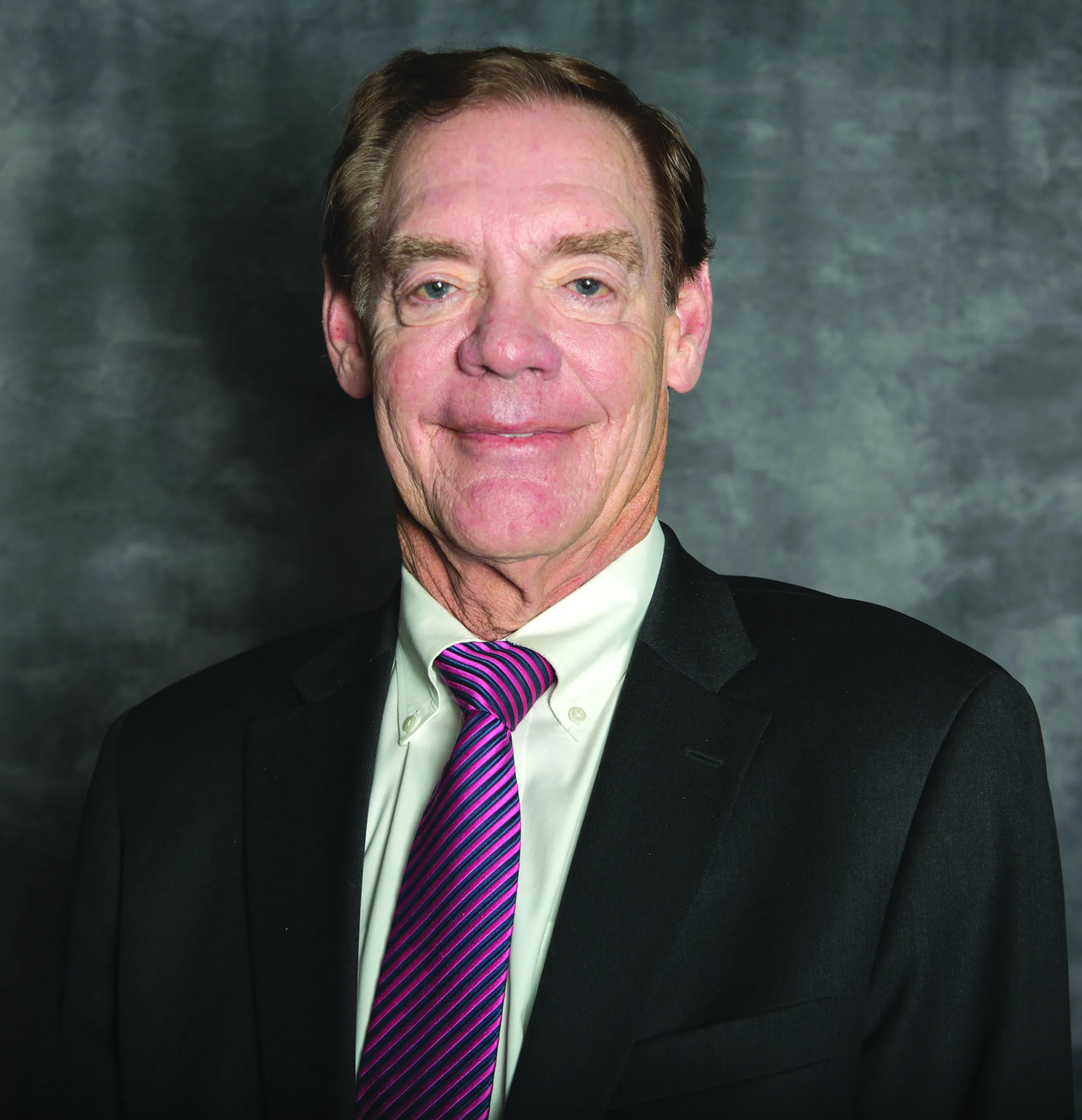
Jack McGrory is CEO of La Jolla MJ Management, LLC, a real estate investment company. He previously served as the city manager for the city of San Diego and has also worked for other real estate investment trusts and groups.
McGrory has been a lecturer at San Diego State University, where he received his master’s degree. He was appointed to the board in 2018.
In July 2022, he voted to increase executive salaries for most CSU executives by at least 7%. McGrory claimed that campus president compensation was “grossly out of the marketplace,” despite the average base salary of about $359,000 before the raises.
“We owe the faculty and the staff and our students a duty to provide them with the best leadership we can find in the United States in those president positions,” McGrory said. “And we can’t do it if we underpay these positions; we have to be competitive.”
In September 2023, McGrory voted to increase systemwide tuition by 6% per year for five years. At the time, he tried to pit faculty against students. He claimed if the board didn’t approve tuition hikes, management would cut jobs and courses.
“We owe the faculty and the staff and our students a duty to provide them with the best leadership we can find in the United States in those president positions. And we can’t do it if we underpay these positions; we have to be competitive.”
Jack McGory
But CFA members didn’t fall for this trap. We argued that increasing tuition only ensures the CSU will become less diverse and more exclusive serving only those able to afford the price of attendance.
Diego Arambula
Diego Arambula is vice president for educational transformation at the Carnegie Foundation. He previously worked at education nonprofits and a network of charter public schools. Arambula had no ties to the CSU prior to his appointment to the board in 2020.
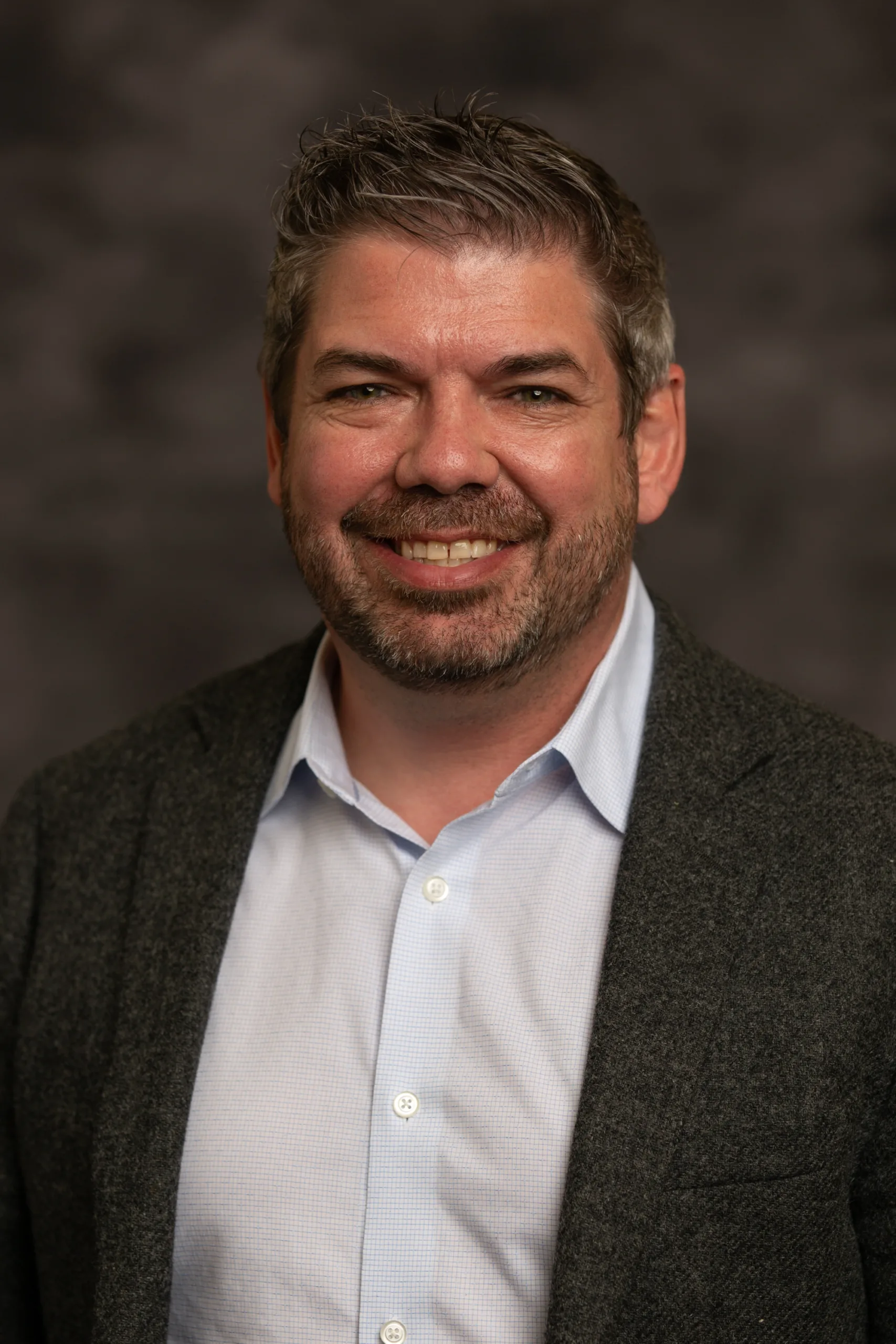
He currently serves as the vice chair of the board in addition to chair of the Educational Policy Committee.
In March 2024, Arambula voted for misguided changes that imposed General Education updates developed for transfer students on all CSU students.
At the time, Arambula said the changes were in the best interest of students, even though CFA members testified about the harmful impact on educational quality and students of color. He also called the policy a beautiful example of shared governance. But the Academic Senate of the California State University passed a resolution saying it lost confidence in the Board of Trustees’ commitment to robust consultation and systemwide faculty feedback required for changes to CSU General Education.
In September 2024, Arambula voiced his support for the chancellor’s interim Time, Place, and Manner (TPM) policy. He dismissed faculty, students, and staff who expressed concerns that the policy suppresses the freedom to protest, freedom of speech, and academic freedom.
In what seems a clear contradiction with the aim and impacts of the TPM policy, Arambula said, “Do we stand for being a university system in which all students are free to express their ideas and feel respected and safe on campus? I’m deeply proud that we are living into those values and I worry that not everyone shares those values.”
Join California Faculty Association
Join thousands of instructional faculty, librarians, counselors, and coaches to protect academic freedom, faculty rights, safe workplaces, higher education, student learning, and fight for racial and social justice.